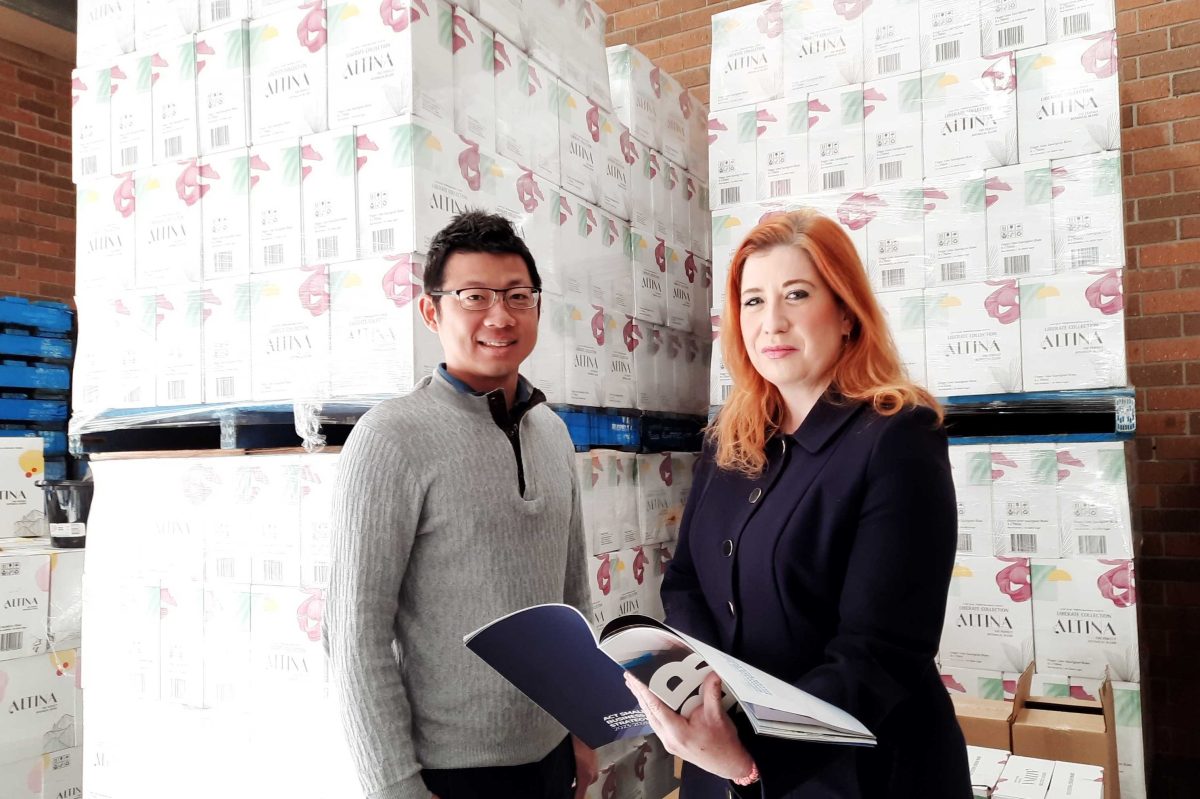
Altina Drinks co-founder and commercial director Alan Tse and Business and Better Regulation Minister Tara Cheyne take a look at the new Small Business Strategy at the business’s Mitchell facility. Photo: Ian Bushnell.
Altina Drinks is a Canberra business success story but, like many others in the ACT, it is grappling with how to find the skilled workers it needs to keep growing.
Co-founder and commercial director Alan Tse admits it’s this problem that could force it to move from its Canberra base, something he does not want to do.
The innovative non-alcoholic drinks maker is just the type of business the ACT Government does not want to lose and a plank of its new Small Business Strategy 2023-2026 is directed at training, attracting and retaining skilled staff.
Mr Tse said if you didn’t attract the right talent pool, businesses could not survive.
“So, I’m looking forward to the strategy really attracting more people and businesses into Canberra and then that will actually lift the employment pool base,” he said.
Business and Better Regulation Minister Tara Cheyne said the recently released workforce attraction online tool provided resources to promote the distinct benefits of working and living in the ACT.
“It really speaks to everything that Canberra offers and helps businesses use the information that’s in there to sell Canberra and to sell everything that we have on offer and why living here and being part of our small business community here is so attractive,” she said.
Under the strategy, the toolkit will be expanded to work alongside specific and tailored actions to support businesses with workforce challenges and will work with the Commonwealth to ensure the ACT’s skilled migration needs are met.
There will also be industry skills and workforce action plans for priority industries such as building and construction, technology, experience (including hospitality, tourism, recreation and creative industries), renewable and sustainable energy, and caring.
Skills development comes under futureproofing small businesses, one of five priority areas in the strategy. The other four are: improve the business experience when dealing with government; support for businesses to start, operate, grow and innovate; showcase and promote local small businesses; and a one-government approach to business.
Ms Cheyne said these were based on the feedback from businesses about the “pain points” they were experiencing and included more than 50 actions, “tangible changes that we’re adopting as a government to support our maturing small business community and to help them be the best that they can be”.
She said the strategy had three objectives – to give businesses back time to future-proof, to empower them, and to grow the ACT economy to 300,000 jobs by 2030.
The strategy also plans a Small Business Expo, the format of which is still to be decided, to showcase enterprises and provide the opportunity for networking and education.

Canberra Business Chamber CEO Greg Harford: “The Chamber is particularly supportive of moves to take a one-government approach to business, support the development of micro-credentials, and improve procurement processes.” Photo: CBC.
A key focus of the strategy is making the experience with government easier for businesses.
Ms Cheyne said a procurement overhaul was underway, the government was simplifying its language to encourage better communication, and Access Canberra had set up one-stop shop for businesses in need of advice.
She said the government was developing a small business training module that could be rolled out across the government to help officials understand business better, a government-to-business secondment program would help officials understand the day-to-day challenges businesses faced, and a business sentiment survey would be piloted with the Canberra Business Chamber.
Other actions include social enterprise grants to support more start-ups, exploring micro-credentials for small business owners in areas such as business administration and digital skills, and providing dedicated individualised support to navigate licensing and approvals through the Access Canberra Business Assist team.
Ms Cheyne said the government had not shied away from hearing how businesses were hurting but wanted to turn that information into an opportunity to do things better.
The strategy will encourage greater diversity, including the BADJI program to support Aboriginal and Torres Strait Islander businesses, investigating any barriers to business ownership experienced by LGBTQIA+ people, people with disabilities and people from diverse cultural backgrounds.
The government will also continue to recognise and encourage women in business through sponsorship of the Canberra Women in Business Awards.
The Canberra Business Chamber welcomed the strategy and praised the government for recognising the importance of small businesses in driving the ACT’s economy forward.
CEO Greg Harford said the chamber had long been concerned at the regulatory burden facing business, the complexity of doing business with multiple government departments, and the challenges of getting government representatives to understand the operations of small business.
“The Canberra Business Chamber is particularly supportive of moves to take a one-government approach to business, support the development of micro-credentials and improve procurement processes,” he said.
“The chamber is looking forward to working constructively with the government on implementing the strategy as rapidly and as effectively as possible.”
Mr Harford said there are around 33,000 small businesses in the territory, employing more than 81,000 Canberrans.




















